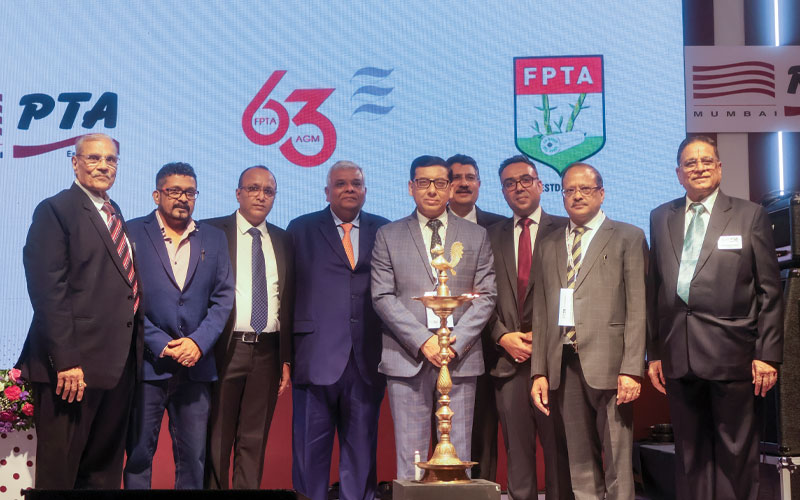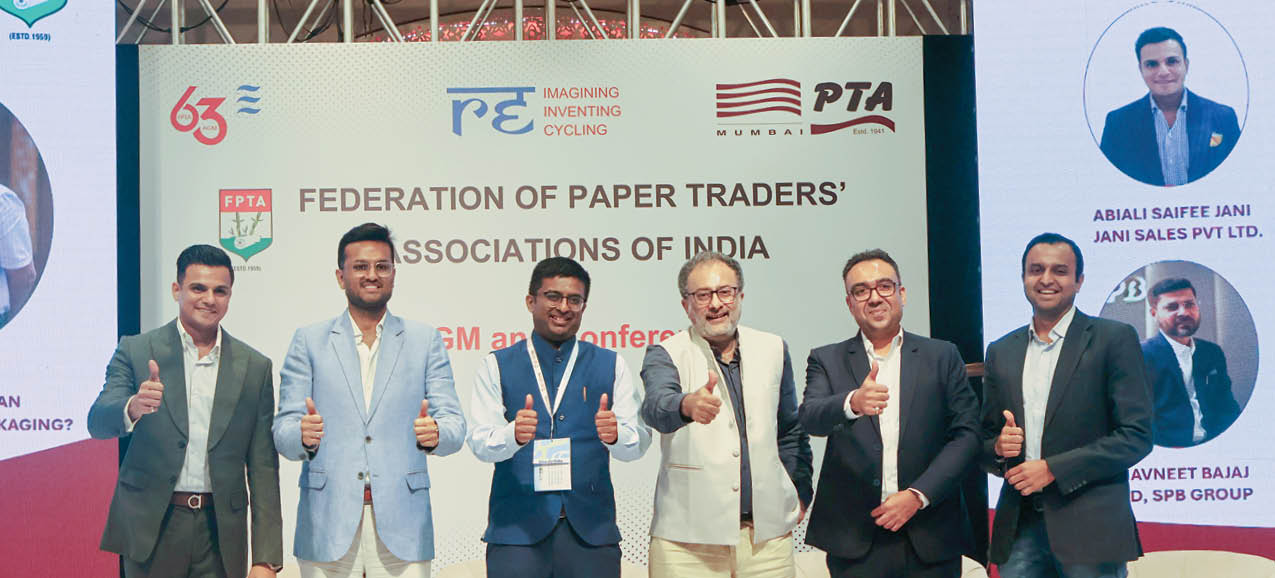The FPTA event discussed technological advancement, exports and imports, branding, financial resources, latest trends and sustainability initiatives in the pulp and paper industry.

Terms such as single-use plastic, sustainability, recycled fiber, and renewable energy sources resonated in the refreshing air of Goa, as pulp and paper manufacturers, traders, suppliers, exporters, and customers converged at this picturesque place for the 63rd Annual General Meeting and Conference of the Federation of Paper Traders’ Associations of India (FPTA).
Held from September 27 to 28, 2024, under the theme ‘Reimagining, Reinventing, Recycling,’ the two-day event attracted over 800 delegates who engaged in discussions aimed at enhancing the environmental sustainability of the pulp and paper industry while addressing the challenges faced by various stakeholders. Notable participants included Mr. Pawan Aggarwal, Managing Director of Naini Papers Limited and President of IPMA, along with Mr. Dalip Bindal, President of FPTA and Mr. Mehul Mehta, Nominee President FPTA and Director at Ratilal P Mehta & Company.
Watch: In Pursuit of Lesser Water Footprint
Mr. Aggarwal emphasized the current condition of the Indian paper industry, asserting that paper is a prominent eco-friendly option in fiber-based packaging. He stated, “Paper is a 100% sustainable product, as it is derived from three types of raw materials: wood pulp, agricultural residues, and waste paper, making it biodegradable, compostable, and recyclable.” He noted that India’s recycling rate is below 50%, in contrast to global rates of approximately 70-80%, suggesting significant room for improvement in the future. He urged a reevaluation of business models, highlighting the importance of innovation, enhanced customer engagement, and a departure from traditional practices to fortify the value chain, enabling manufacturers to endure and prosper in this changing environment.
In his speech, Mr. Bindal addressed the pressing challenges confronting the industry, particularly the transition towards utilizing paper as an alternative to single-use plastics. He pointed out the ongoing issues related to payments, recovery, and pricing that remain unaddressed, despite efforts made over the last two years. The difficulties in the southern markets, coupled with recent budgetary limitations, have further affected operations, underscoring the necessity to restore trust with stakeholders.
During a panel discussion focused on technological advancements, emerging trends, and sustainability efforts within the industry, Mr. Pritesh Shah, Joint Managing Director of Shah Paper Mills, remarked, “Technology in India is advancing, and as the costs associated with it decrease, an increasing number of individuals are beginning to invest. We project that digital printing will experience a growth rate of 20-22% by the years 2027-28. A primary objective is to enhance our existing operations, thereby improving product quality.”

Addressing the necessity of pulp imports within the sector, Mr. Chirag Jain, Director of MLM India Limited, stated, “Despite the push for domestic pulp mills, the importation of pulp remains unavoidable. China, being the largest pulp importer, also produces it by sourcing wood chips and holds a dominant position in the market.” He highlighted a significant challenge regarding the short-term nature of contracts; unlike global mills that prefer long-term agreements, the Indian market is heavily reliant on spot purchases. “This situation requires reform. Several large South American pulp mills are contemplating the cessation of pulp shipments to Asian ports, which currently provide India with expedited services, akin to the operations of APP and APRIL. Should this occur, India could cultivate a robust ecosystem for pulp production, conversion, and export, thereby facilitating smoother business transactions. Presently, the country’s consumption is escalating at an extraordinary rate, surpassing supply and necessitating imports from China.”
Mr. Abiali Jani, Director of Jani Sales, shared insights on how he and his father initiated their export journey to the Middle East. “When we first started exporting paper, there was a widespread misconception internationally that Indian mills faced challenges in delivering quality products or timely shipments.” He recounted how his father prioritized altering this perception over the years, which ultimately led to establishing a strong foothold in the Middle East. The guiding principle was to understand customer needs and customize their offerings accordingly.
Mr. Shah emphasized the necessity for the sector to adopt a long-term vision regarding exports. He stated, “A short-term approach, characterized by frequent shifts in strategy, is not viable. Our commitment to exporting must be unwavering, ensuring that we address our customers’ needs from various angles, including geopolitical considerations, human resources, and the availability of skilled labor.”
Financial Approach
Mr. Jani emphasized the significance of fostering robust relationships with banks as a key strategy for effectively addressing the current market challenges. They should be regarded not merely as financial institutions but as collaborators in your business, he noted.
Additionally, the necessity for FPTA to actively advocate for credit insurance was highlighted, as it is believed to greatly improve cash flow and assist in assessing liquidity, inventory levels, and payment history. Mr. N. Annamalai, Managing Director of Specialty Paper and Board Private Limited, pointed out the importance of traders maintaining a watch list. This can greatly facilitate timely and informed purchasing decisions. Such a strategic approach can help navigate market fluctuations and optimize opportunities.
Also Read: Paper Middle East Eyes Networking and Collaboration Opportunities
Latest Trends
Income levels are undergoing changes, and concurrently, the paper industry is evolving from 2.0 to 3.0 and 4.0, which is instigating transformation throughout the nation, Mr. Annamalai observed. He pointed out that Generation Z is allocating a substantial portion of their disposable income, resulting in a heightened demand for premium products and packaging. He further emphasized the growing necessity for sophisticated and well-designed products to meet the expectations of this demographic.
Mr. Jain underscored the increasing popularity of molded fiber products. He stated that molded fiber pulp is set to emerge as a significant trend, and he expressed admiration for Param’s proactive initiatives in this domain.
Sustainability
The concept of sustainability is interpreted in various ways. Some individuals may concentrate exclusively on initiatives aimed at cleaning, while others may prioritize the elimination of single-use plastics or the adoption of recycled materials, Mr. Annamalai elucidated. “For a company like ours, it is about how efficiently we are able to use our energy and water process.”
According to Mr. Shah, sustainability represents an action taken to enhance integration. He emphasized the importance of encouraging brand owners, governmental agencies, institutions, and NGOs to promote this awareness. It is essential to shift this perception and to embrace the diverse perspectives regarding how sustainability is understood and implemented, he asserted.
Following the event, a consensus emerged that the industry’s success relies on a combination of a clear vision, skilled personnel, efficient processes, and strong systems.
Traders Takes

‘‘China and Indonesia have emerged as leaders in domestic production on the global stage. Major industries are working to transition from plastic containers to paper alternatives for liquid packaging; however, this process will require time. The packaging sector is experiencing significant growth, driven by the rise of e-commerce. Consequently, materials such as graph paper, duplex board, and virgin board are currently performing well, although this performance is subject to cyclical fluctuations.’’
– Mr. Mehul Mehta, Owner, Ratilal P Mehta & Company
‘‘The paper industry is undoubtedly experiencing significant growth. It is expanding at an annual rate of approximately 7 to 8 percent, while the packaging segment is projected to grow by around 12 to 15 percent. Additionally, advancements in conversion processes, including the introduction of new machinery and technologies such as digital printing, are rapidly emerging in India. Consequently, the demand for high-quality paper and paperboard will certainly continue to increase.’’
– Mr. Nimesh Vora, Director, Srinivas Papers Private Limited


‘‘The paper industry has undergone significant transformations in the aftermath of the COVID-19 pandemic. The sector experienced substantial shortages of both raw materials and finished goods due to lockdowns, logistical challenges, and shipping disruptions. Consequently, it is imperative to stay proactive regarding the domestic and international markets and their vulnerabilities to events such as the Russia-Ukraine conflict.’’
– Mr. Hiren Karia, Owner, Jay Raj Fine Paper Company and Shah Devji Shivji & Co.
‘‘As literacy rates continue to rise, it is anticipated that the demand for paper will also increase proportionately. This trend offers significant opportunities for trade and manufacturing in the paper sector. Furthermore, it is essential for every manufacturer, trader, and entrepreneur to play an active role in advocating for paper products.’’
– Mr. Shrinath Agrawal, Vice President, Federation of Paper Traders’ Associations, Owner Murari Paper Industries


‘‘The pandemic has led to significant price fluctuations influenced by various global factors, including changes in freight costs and the volatility of pulp prices resulting from the ongoing conflict. Consequently, it is essential for us to remain continuously informed about global developments. Additionally, as Asian nations have been offloading their stocks in India, government intervention is becoming increasingly necessary.’’
– Mr. Sumit Shah, Director, Shambhulal A. Shah & Company



